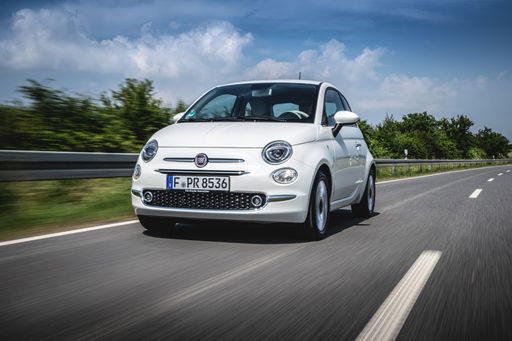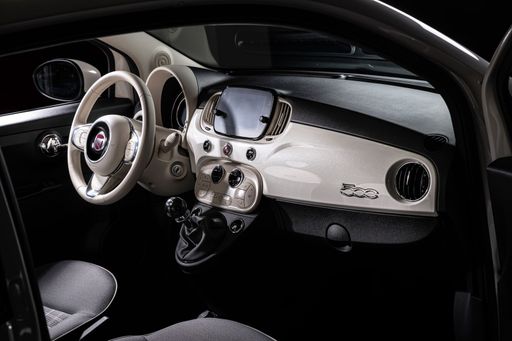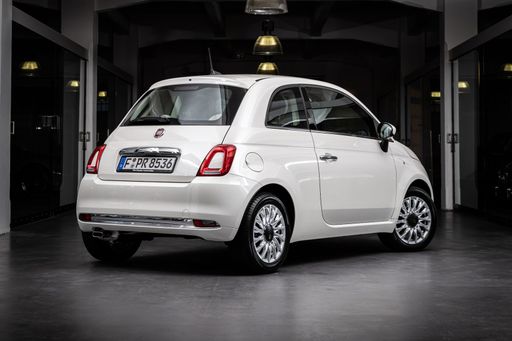Fiat 500 vs Hyundai Bayon – Differences & prices compared
Compare performance, boot space, consumption and price in one view.
Find out now: which car is the better choice for you – Fiat 500 or Hyundai Bayon?
The Fiat 500 (Hatchback) comes with a Electric engine and Automatic transmission. In comparison, the Hyundai Bayon (SUV) features a Petrol engine with Manuel or Automatic transmission.
When it comes to boot capacity, the Fiat 500 offers 185 L, while the Hyundai Bayon provides 411 L – depending on how much space you need. If you’re looking for more power, decide whether the 118 HP of the Fiat 500 or the 100 HP of the Hyundai Bayon suits your needs better.
In terms of consumption, the values are 13 kWh per 100 km for the Fiat 500, and 5.40 L for the Hyundai Bayon.
Price-wise, the Fiat 500 starts at 25300 £, while the Hyundai Bayon is available from 20100 £. Compare all the details and find out which model fits your lifestyle best!
Fiat 500
The Fiat 500 is a compact and stylish city car that has captured the hearts of urban drivers with its charming retro design. Its nimble handling and efficient engine make navigating tight city streets a breeze, while its cosy interior offers a surprising amount of comfort and modern technology. The car's iconic silhouette and vibrant colour options ensure it stands out, offering a unique blend of timeless appeal and contemporary flair.
details @ media.stellantis.com
@ media.stellantis.com
 @ media.stellantis.com
@ media.stellantis.com
 @ media.stellantis.com
@ media.stellantis.com
Hyundai Bayon
The Hyundai Bayon is a compact crossover that effortlessly merges practicality with modern design. Its sleek exterior and spacious interior make it an ideal choice for urban settings and longer journeys alike. With a focus on comfort and connectivity, this vehicle provides a smooth driving experience paired with advanced technology features.
details @ hyundai.news
@ hyundai.news
 @ hyundai.news
@ hyundai.news
 @ hyundai.news
@ hyundai.news
 @ hyundai.news
@ hyundai.news
 @ hyundai.news
@ hyundai.news

|

|
|
|
|
Costs and Consumption |
|
|---|---|
|
Price
25300 - 35600 £
|
Price
20100 - 25800 £
|
|
Consumption L/100km
-
|
Consumption L/100km
5.4 - 5.5 L
|
|
Consumption kWh/100km
13 - 14.7 kWh
|
Consumption kWh/100km
-
|
|
Electric Range
190 - 321 km
|
Electric Range
-
|
|
Battery Capacity
21.3 - 37.3 kWh
|
Battery Capacity
-
|
|
co2
0 g/km
|
co2
124 g/km
|
|
Fuel tank capacity
-
|
Fuel tank capacity
40 L
|
Dimensions and Body |
|
|---|---|
|
Body Type
Hatchback
|
Body Type
SUV
|
|
Seats
4
|
Seats
5
|
|
Doors
3 - 4
|
Doors
5
|
|
Curb weight
1330 - 1475 kg
|
Curb weight
1170 - 1195 kg
|
|
Trunk capacity
185 L
|
Trunk capacity
411 L
|
|
Length
3632 mm
|
Length
4180 mm
|
|
Width
1683 mm
|
Width
1775 mm
|
|
Height
1527 mm
|
Height
1500 mm
|
|
Payload
250 - 305 kg
|
Payload
460 - 465 kg
|
Engine and Performance |
|
|---|---|
|
Engine Type
Electric
|
Engine Type
Petrol
|
|
Transmission
Automatic
|
Transmission
Manuel, Automatic
|
|
Transmission Detail
-
|
Transmission Detail
Schaltgetriebe, Automat. Schaltgetriebe (Doppelkupplung)
|
|
Drive Type
Front-Wheel Drive
|
Drive Type
Front-Wheel Drive
|
|
Power HP
95 - 118 HP
|
Power HP
100 HP
|
|
Acceleration 0-100km/h
9 - 9.5 s
|
Acceleration 0-100km/h
11.3 - 12.4 s
|
|
Max Speed
135 - 150 km/h
|
Max Speed
176 - 179 km/h
|
|
Torque
220 Nm
|
Torque
172 - 200 Nm
|
|
Number of Cylinders
-
|
Number of Cylinders
3
|
|
Power kW
70 - 87 kW
|
Power kW
74 kW
|
|
Engine capacity
-
|
Engine capacity
998 cm3
|
General |
|
|---|---|
|
Model Year
2023 - 2025
|
Model Year
2024
|
|
CO2 Efficiency Class
A
|
CO2 Efficiency Class
D
|
|
Brand
Fiat
|
Brand
Hyundai
|
Fiat 500
The Timeless Charm: Introducing the Fiat 500
The Fiat 500 has long been a symbol of Italian style and urban practicality. As we navigate a new era in automotive history, the Fiat 500 continues to adapt and remains a much-loved vehicle worldwide. Let’s delve into the latest technical details and innovations that make this car a modern classic.
Electric Heartbeat: The Engines and Performance
The latest Fiat 500 models are powered entirely by electricity, showcasing a commitment to sustainable mobility without sacrificing performance. Under the stylish bonnet lies a choice between two power outputs, starting from a lively 70 kW (95 PS) to an energetic 87 kW (118 PS). This range of electric motors ensures that whether you’re navigating narrow city streets or cruising along open roads, the Fiat 500 delivers engaging performance with zero emissions.
Efficiency Meets Innovation: Energy Consumption and Range
Efficiency is at the forefront of the Fiat 500’s design. With energy consumption figures as low as 13 to 14.7 kWh/100km, the car balances power and performance efficiently. Electric range varies across the models, from 190 km for those designed for short urban commutes to an impressive 321 km for longer journeys. The innovative lithium-ion battery options—spanning 23.8 kWh to 42 kWh—are neatly integrated to maintain the car’s compact dimensions.
Technological Marvel: Smart Features and Design
The Fiat 500 is adorned with advanced features that enhance convenience and safety. It comes with an intuitive infotainment system that includes smartphone connectivity, navigation, and various driver assistance technologies, ensuring a seamless driving experience. The “La Prima” equipment line offers premium materials and a luxurious feel inside the cabin, making every journey comfortable and enjoyable.
Urban Flexibility: Compact Dimensions and Practicality
Designed for urban environments, the Fiat 500’s dimensions make it ideally suited for city dwellers. With a length of 3632 mm, width of 1683 mm, and height of 1527 mm, it’s easy to navigate through traffic and park in tight spaces. Despite its compact size, the Fiat 500 provides a practical boot capacity of 185 litres, perfect for daily errands or a weekend getaway.
Commitment to the Environment: Sustainability Focus
The Fiat 500 exemplifies a dedication to eco-friendliness with its CO2 emissions at zero, earning it an A in CO2 efficiency class. By choosing this vehicle, drivers are contributing towards a future with reduced automotive pollution, supporting cleaner air and healthier urban living.
Conclusion: The Future of Urban Driving
The Fiat 500 perfectly blends timeless style with modern electric innovations, setting a precedent for future city cars. Whether you prioritise aesthetic design, sustainable driving, or a premium driving experience, the Fiat 500 is designed to exceed expectations and redefine urban transportation.
Hyundai Bayon
Introducing the Hyundai Bayon: A New Era in Compact SUVs
The Hyundai Bayon, a compact SUV designed with urban adventurers in mind, is making waves with its exceptional blend of style, performance, and technology. The brand has pulled out all the stops to ensure that the Bayon stands out in the crowded SUV market, offering a vehicle that is both practical and innovative.
Sleek Design and Cutting-Edge Aerodynamics
The Bayon features a striking exterior design, characterised by its bold lines and angular shapes. With a length of 4180 mm, a width of 1775 mm, and a height of 1500 mm, the Bayon commands attention with its modern appeal and aerodynamic efficiency. These dimensions not only contribute to its sleek design but also enhance fuel efficiency, achieving an impressive 5.4 L/100 km.
Engine Performance and Specifications
Under the bonnet, the Bayon is powered by a 1.0-litre T-GDI petrol engine, delivering a robust 100 PS or 74 kW. This engine is available with either a manual or automatic gearbox, meeting varied driver preferences. The front-wheel-drive system complements its urban-centric design, ensuring a smooth and responsive ride.
Maximised Interior Space and Comfort
The spacious interior of the Bayon accommodates up to five passengers comfortably. The vehicle boasts a boot space of 411 litres, perfect for both everyday use and weekend getaways. The cabin is designed with practicality and technology in mind, with intuitive controls and ample storage options.
Advanced Technology and Connectivity
Hyundai has equipped the Bayon with state-of-the-art technology to enhance the driving experience. The SUV features a high-resolution touchscreen, offering seamless connectivity with Apple CarPlay and Android Auto. Safety is also a priority, with multiple driver assistance systems including lane-keeping assist and forward collision avoidance assist.
Environmental Efficiency
Despite its powerful performance, the Bayon achieves a respectable CO2 efficiency class of D, with emissions as low as 122 g/km. This balance between performance and environmental responsibility makes the Bayon an attractive option for conscientious drivers.
Affordability and Market Appeal
The Hyundai Bayon is competitively priced, ranging from €22,900 to €29,600. Its affordable running costs, estimated at 32.3 to 36.4 cents per kilometre, further enhance its appeal to budget-conscious consumers. With monthly costs ranging from €806 to €909, the Bayon provides excellent value without compromising on features or performance.
Final Thoughts
The Hyundai Bayon truly stands out in the compact SUV segment, combining style, innovation, and practicality in an appealing package. It offers a versatile driving experience suited to the demands of modern urban living, making it a top contender in its class. As Hyundai continues to champion forward-thinking design and technology, the Bayon is a testament to the company's ongoing commitment to excellence.
The prices and data displayed are estimates based on German list prices and may vary by country. This information is not legally binding.
